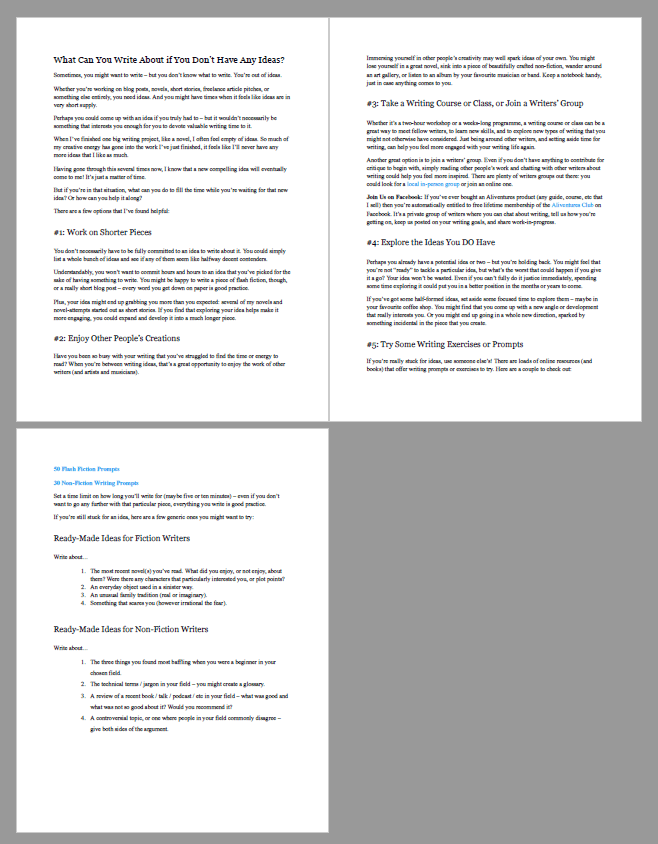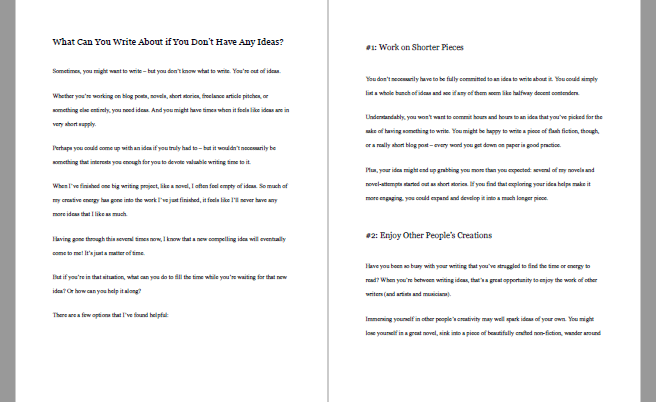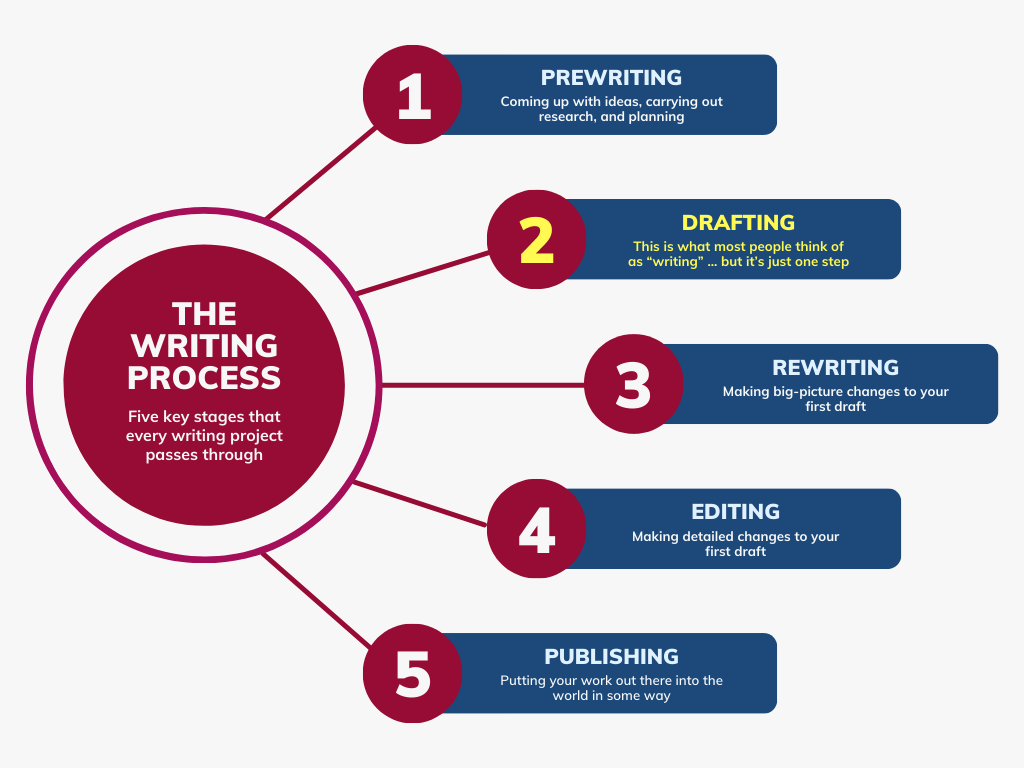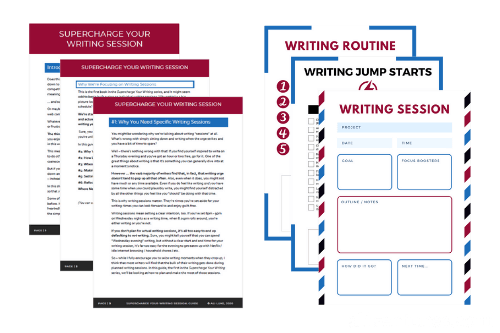How Long Does it Take to Write 1000 Words?

This post was first published in April 2020 and updated in May 2023.
Whether you’re working on a novel, blog post, academic essay, or any other big project, it’s really helpful to know roughly how long it takes to write 1000 words.
Maybe it’s your daily target for your novel. It’s a nice round number, after all, and it makes it easy to figure out how long it’s likely to take you to complete a draft. If you’re aiming for an average-ish novel length of 80,000 words, then that’ll take you 80 days, writing 1000 words per day.
Or maybe you’re working on a 3000 word non-fiction piece—a blog post, an article, an essay, or an assignment of some kind. You want to plan your time carefully and make sure you hit your deadline. This means you need to know roughly how long it’ll take per 1000 words.
How Long is 1000 Words (in Pages)?
On 8-1/2” x 11” paper (US) or A4 paper (UK), in 12 point type, 1000 words is about 4 pages double-spaced or 2 pages single-spaced.
If you have a lot of dialogue (e.g. in fiction) or very short paragraphs (e.g. in a blog post), your 1000 word piece will probably be 3 pages single-spaced or 6 pages double-spaced.
Here’s an example piece, single-spaced in 12 point Times New Roman, that’s 1005 words long. (I used my post What Can You Write About if You Don’t Have Any Ideas, with the final paragraph removed.)
As you can see, it takes up most of 3 pages.

Here’s the start of that same piece double-spaced – it ends up running onto 6 pages.

These days, if you have a length requirement from a writing competition, freelancing client, or university assignment, it’s likely to be in words, not pages.
But if you are told how many pages to write instead of being given a word count (e.g. “bring 4 pages to share at our next meeting”) then it helps to know that 1000 words is about 4 double-spaced pages.
Is 1000 Words/Day a Realistic Goal?
Over the years, I’ve seen quite a few writers aiming to write 1000 words a day. It’s a nice round number (and it’s what Stephen King advises as – slightly alarmingly – a minimum target in On Writing).
But I think 1000 words a day is often too high a target.
If you have a writing career (like freelancing or working as an in-house writer) or you’re an English Literature student, you might have hours available to write, and 1000 words would be no problem at all …
… but if you’re writing fiction around a day job, kids, or other commitments, a thousand words is going to take up a hefty chunk of your free time.
Which brings me to…
How Long Does it Take to Write 1000 Words?
If you want a very rough rule of thumb, it takes 1–2 hours to write 1000 words.
How quickly you write, though, depends on how experienced you are, what you’re writing, and how your own personal creative process works.
You’ll want to keep in mind that:
Experienced Writers Are Faster Than First-Time Novelists
The more you do something, the faster and more efficient you become.
If you’re a beginner writer, it might take you three hours to write someting that an experienced writer could complete in an hour: that’s totally normal, and you’ll find that you write faster over time.
Academic Writing is Significantly Slower Than Other Types of Writing
Academic writing requires more complexity of both thought and language than many other types of writing … meaning it will take significantly longer to write a 1000 word essay than to write a 1000 word article or blog post.
If you’re stopping along the way to do additional research or add in references, that can slow you down even more.
Your Preferred Writing Process Will Affect Your Speed
Some writers (like me) draft fast but then rewrite and edit what they’ve written a lot.
Other writers draft their article or story much more slowly, but then don’t need to rework things nearly so much.
The entire writing process may take roughly the same length of time either way, but the speed of drafting 1000 words could vary significantly.
For some writers, 1000 words is a great working day. For others, 1000 words is something they can easily dash off in less than an hour. It depends on so many different factors—which I discuss in my post on Why Some Writers Are Much Faster Than Others.
What really matters is how long it takes you to write 1000 words.
Figuring Out How Long It Takes You to Write 1000 Words
Personally, I can normally draft 1000 words of fiction in an hour. Sometimes it takes a little longer; sometimes I’m a little faster. But that gives me a good sense of how long it’ll take to draft, say, a 3000 word chapter.
When it comes to my freelance content writing, I can normally produce 1000 finished words in an hour. So if I’m writing a 2,500 word blog post, I’d expect to have it complete, edited, and optimized for SEO in 2.5 hours.
But that’s after 15+ years of freelancing, and it also assumes I already have a full outline, only need to do limited research, and won’t need to edit extensively.
To figure out your own “average time to write 1000 words” you first need to:
- Record the total length of your writing sessions across a week.
- Record the total number of words you wrote that week.
Worked Example
For instance, let’s say you’re working on a 3000 word essay (or a similar piece of academic writing). You’ve already planned it out and noted some key quotes you want to use, with their references—so you just need to draft the whole thing.
You work on it for 2 hours on Monday, 1.5 hours on Tuesday, and 1.5 hours on Wednesday, for a total of 5 hours. Your draft is complete, and for simplicity’s sake, let’s say it came to 3000 words exactly.
It took you 5 hours to write 3,000 words. That’s a rate of 600 words per hour.
So how long did it take you to write 1,000 words?
- First, divide the total number of words (3,000) by 1,000 = 3
- Then, divide your total time (5 hours) by 3 = 1 hr 40 minutes
It takes you 1 hour and 40 minutes to write 1,000 words.
Tip: You might want to track your average over time to see whether it changes. You may also want to track whether you’re faster at certain times of day – e.g. whether you tend to write faster in the mornings or evenings – as this can help you identify your most productive hours.
Writing 1000 Words in the Context of the Entire Writing Process
Seeing your word count rise is always encouraging, but purely focusing on how many words you’ve written won’t necessarily do much to improve the total time you take to write a strong article, compelling story, or coherent essay.
For instance, if you leap into drafting (just one writing phase of several different stages) as quickly as possible, you might miss out on the chance to come up with a better idea, or to do more extensive research that could make your finished piece stronger.
Here’s how the drafting stage fits into the whole of the writing process:

How long it takes to write 1000 words will depend on how long you’ve spent on the prewriting phase: a really big step that involves coming up with and developing the concept for your piece, thinking about your target audience, carrying out your research, and planning the structure of your piece.
If you rush the prewriting stage, you might well be writing fast … but if you haven’t planned well or followed the brief (or essay instructions) then you could have a lot of time consuming rewriting ahead of you.
Whether you’re doing professional writing (e.g. for freelance clients), working on a novel, or writing a 3000 word essay, you want to put an appropriate level of focus on each step of the process. What matters isn’t simply how quickly you can watch those words appear on the computer screen … it’s how strong your finished piece is.
How Long Does it Take to Type 1000 Words?
It takes about 25 minutes to physically type 1000 words. (That’s based on an average typing speed of around 40 words per minute. You may be faster or slower than the average person!)
If you’re hitting that speed when you’re writing a story, article, blog post, etc, that’s a really fast pace! It probably means you’re working on something that you’ve already outlined in lots of detail, or that you’re producing stream-of-consciousness writing.
For most experienced writers, what limits us isn’t our typing speed. It’s how quickly we can come up with ideas and convey them in words.
However, if your typing speed is fairly slow (say, 20 words per minute) that may be holding you back from writing faster. You might want to check out your typing speed here and try out some typing speed games to help you improve your typing skills and increase your average writing speed a bit.
Why Does it Matter How Long it Takes to Write 1000 Words?
Knowing how long it usually takes you to produce 1000 words of whatever you’re working on is helpful for almost all writers.
- If you’re a novelist, knowing that producing 1000 words of draft material takes you about an hour gives you a clearer picture of whether or not that’s a realistic daily (or even weekly) goal.
- If you’re a professional writer or freelance writer, knowing how long 1000 words takes you (on average) to write lets you give your clients more accurate quotes – and may even prompt you to raise your rates.
- If you’re a blogger, having a clear idea of your writing speed lets you figure out how much time you need to write a 1500 word blog post every week.
- If you’re a student, knowing that you have a week to write a 3000 word essay and knowing that it’ll take 5 hours to draft (if 1000 words takes you 1 hr 40 minutes) lets you plan your time.
Experienced writers tend to have a good grasp of how long they’ll take to write 1000 words. That means they can easily schedule writing into their day and they won’t be caught out by an assignment taking far longer than they expected.
How Can You Get Faster at Writing?
There are lots of ways to improve your writing speed – but the absolute biggest factor is how focused you are.
If you stop writing every 5 minutes to check social media or reply to texts, then you’re not only losing actual writing time, you’re having to spend extra time getting back into the flow of what you were working on. Improving your focus could make a massive difference.
Try Shorter Writing Sessions
It can help to have shorter writing sessions, at least initially.
You might manage 1000 words in a truly focused hour-long session even though you normally spend three or four hours writing that much due to constant distractions.
Develop Your Creative Process
It’s also a good idea to experiment with and develop your own ideal writing process, as there are quite a few factors within this which could affect your speed. That could mean:
- Thinking about when your most productive hours are, and scheduling your writing time during these. (How long does it take to write 1000 words during your best hours vs your worst hours?)
- Developing a good system for doing research before you start writing your story, article, or essay.
- Outlining your whole piece so you can tackle one point at a time during the writing.
- Deciding whether you’d rather write fast during the first draft and edit later … or settle for a lower average speed if that means much less editing.
- Leaving the trickiest parts of your piece to come back to once you’ve drafted the main body. Lots of writers find it’s easiest to tackle the introduction after completing most of their article or essay (or even after tackling the conclusion).
- Experimenting with different writing tools. I used to write in MS Word, but now I find Google Docs works best for me, as it’s so quick to load up and I can easily access it from any device. I’ve also used software like Scrivener and DarkRoom.
Give some of these a try … and see what works for you.
Get Faster With Supercharge Your Writing Session
My guide Supercharge Your Writing Session is designed to help you make the most of the time you have – whether that’s a short or long period. It’s fluff-free and packed with tips you can put into action straight away, plus it comes with several printables to help you craft a quick getting-started routine, plan your writing sessions in advance, and more.
It’s just $8 for everything (including both coloured and black-and-white versions of the printables) and you can get all the details here.
About

I’m Ali Luke, and I live in Leeds in the UK with my husband and two children.
Aliventures is where I help you master the art, craft and business of writing.
Start Here
If you're new, welcome! These posts are good ones to start with:
Can You Call Yourself a “Writer” if You’re Not Currently Writing?
The Three Stages of Editing (and Nine Handy Do-it-Yourself Tips)
My Novels

My contemporary fantasy trilogy is available from Amazon. The books follow on from one another, so read Lycopolis first.
You can buy them all from Amazon, or read them FREE in Kindle Unlimited.



Oh my gosh, it’s so good to know I’m not being neurotic by tracking the amount of time it takes for me to produce x amount of words.
I actually have a timed for a weirdly specific amount of words – 750 words, to be exact. I used to write on the website 750words every day, and it’d take me approximately 20 minutes if I’m just stream of thought journaling. However, actually writing fiction to get to 750 words takes much longer and greatly depends on if I’m inspired or not. If I’m not inspired, it can take me a few days to reach 750 words. If I am inspired, it can be 30 minutes. It greatly depends on my mood and energy and inspiration.
Ooh, what a good point about how much mood/energy can affect this! I definitely find that too (though for me personally, it’s also pretty predictable what times of the day/week my mood and energy will be at their best).
Hi there,
One time, it took me around 45 minutes to write a 1,000 blog post. It was only because the topic needed little research. lol
Thanks for creating this article!
Wow, that’s super-fast! I definitely find I hit my highest speeds on blog posts that don’t need much research, too. It’s easy to get on a roll with those. 🙂
Thanks Ali!
indeed, it is a good technique.